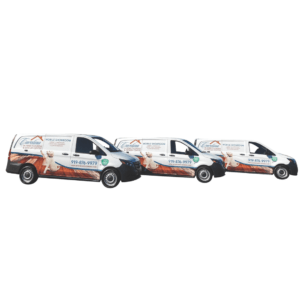 The general move toward e-commerce and online shopping spells opportunities for specialty flooring retailers—whether they are fully, 100% mobile or if mobile showrooms are just an extension of their brick-and-mortar operation. FCNews spoke with retailers across the spectrum on this issue.
The general move toward e-commerce and online shopping spells opportunities for specialty flooring retailers—whether they are fully, 100% mobile or if mobile showrooms are just an extension of their brick-and-mortar operation. FCNews spoke with retailers across the spectrum on this issue.
Following are some of their tips to master the mobile showroom.
Seize the opportunity
While mobile showrooms existed before 2020, the pandemic may have played a role in the decision for more retailers to invest in that portion of the business. For dealers like Alfred Soyyar, owner of Houston, Texas-based Buffaloe Floors and Up, it was an opportunity that arose out of necessity. “The initial idea was to address the fact that our showrooms were closed,” he explained. “Our mobile showrooms allowed customers to shop in a safe environment.”
Ditto for Walt Carney, owner of Simplicity Floor and Tile in Anderson, Calif. “People just didn’t want to go into stores at the time, and they still don’t. The brick-and-mortar-based carpet stores are not doing as well as they used to.”
Not all mobile showrooms were begun due to COVID-19, however. Mike Nelson, owner of Raleigh, N.C.-based Carolina In Home Flooring, has been operating mobile showrooms since 2010. Having experience on the installation side, Nelson said he understood the philosophy behind in-home sales. “With my background and knowing the product, I could offer much better product and service than the Empires of the world,” he explained. Starting off in his personal vehicle doubling as a showroom, he has since invested in Mercedes Metris vans and expanded his sales team.
Carney is shifting to mobile-based sales with 75% of his business coming from the road. He also said there’s less overhead and fewer fixed costs with the shop-at-home format. This set-up gives Simplicity Floor and Tile the best of both worlds—still having a location for traditional retail shoppers while prioritizing mobile sales. “We have a showroom but in a warehouse environment,” he said. “We save the thousands of dollars in retail space and our overhead is a quarter of the brick-and-mortar facility.”
Learn as you go—and grow
When it comes to developing (and sustaining) a mobile showroom business, it’s usually not a home run right out of the gate. Nor is there a single formula for tried-and-true success. In short, it’s about learning as you go. “It’s difficult to get into this industry,” Carolina In Home Flooring’s Nelson said. “You have to know what you are doing.”
Some business owners, like Buffaloe’s Soyyar, say it’s important to make the investment up front. “One of the key decisions was to build a showroom that gives the experience of a real showroom,” he explained. “By creating something that’s large enough to set you apart from the competition, we got more press coverage since ours is unique. We need to make them useful beyond the pandemic, they’re not cheap to build.”
Carney and Nelson have taken a slightly different tack but made significant investments nonetheless. For his part, Carney purchased four vehicles to support that side of the business versus trying to replicate the showroom on wheels. “I’m sure driving up to the front of a house in a $100K custom showroom would be fantastic,” he said. “I don’t know if it would pay for itself. But that is where we are going to be heading.”
Nelson emphasized the difference in the sales approach for mobile sales. “There is a learning curve,” he explained. “There are people who are good at sales in the showroom but put them in a house and it’s completely different.”
Perhaps the greatest benefit of mobile showrooms, proponents agree, is the ability to expand into new markets. “The most success we’ve had with them was in areas that don’t have your traditional showrooms,” Soyyar noted. “In smaller towns and cities the demand is there, and they would rather have us send it to them.”
Investing in a remodeled van or bus may provide more versatility, but it will require a lot more time to pay itself back. It may be easier to expand one’s base of operations with a lower cost vehicle. The key is finding what works best for your market, experts note.
Ask for the sale
Much like sealing the deal with a customer who visits a brick-and-mortar flooring store, it’s just as important to close the deal with the shop-at-home client. “You have to be a good closer because you don’t want to have to go back to her home a second time,” said Jimmy Poulos, president and founder of Flooring 101, with multiple brick-and-mortar locations in the California market.
Poulos stressed the importance of maximizing every home visit with the client. The key to sealing the deal is creating a sense of urgency. “You can say, ‘By the way, we have a 25% discount for all shop-at-home products. You’re not going to find the same deal in the store.’”
Fringe benefits
Among the main benefits that come with running a mobile showroom operation is it allows retailers to advertise their brand via non-traditional means. “Our mobile showrooms are a great advertising tool for us,” Buffaloe’s Soyyar stated. “We take them to various locations, conferences and fairs, park them and it’s just a giant billboard for us. Buffaloe Floors and Up also partners with realtors and other business to use their showroom as an attraction when it is not out on sales calls.”
Pie in the sky
Some proponents of mobile showrooms are so confident in the format that they say it could evolve into something much bigger. Nevermind bringing the showroom directly to the consumer’s doorstep; now, some are considering delivering samples using unmanned vehicles. Buffaloe’s Soyyar, for example, said the future of flooring could become fully automated one day.
“Whether that’s in 10-15 years, a mobile showroom could self-drive to your house,” he said. “And with the visualizers we have—with the technology on phones where customers can scan a square footage and we can augment a floor in their home—the consumer can make a decision all on their own.”

